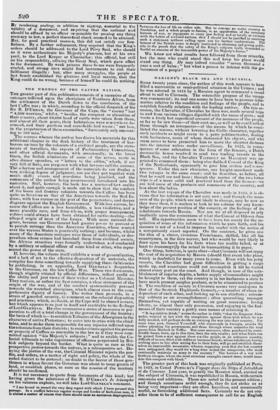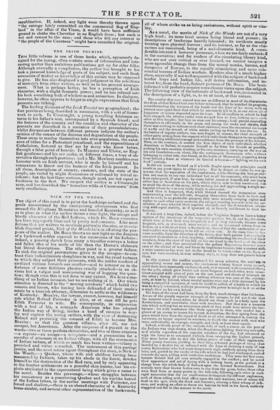MARIGNY'S - BLACK SEA A-ND CIRCASSIA.
SOME twenty years since, the author of this work appears to have filled a mercantile or semi-political situation in the Crimea ; and
he was selected in 1818 by a Russian agent to command a vessel about to sail to Circassia. The ostensible purpose of the voyage was commercial ; its real one seems to have been to procure infor- mation relative to the condition and feelings of the people, and to establish friendly relations with the leading natives. On this oc- casion, the Chevalier, if Chevalier he then was, made several trips to and from various villages dignified with the name of ports; and wrote a lively but superficial account of the manners of the people, so far as be saw them—of their custems, as well as he could collect them through an interpreter—of the means by which he conci-
hated the masses, without lowering his Gallie character, together such incidents as might occur to a petty politico-trader, dealing with barbarians, many of' whom distrusted his objects, and who seem never to have permitted him to move the shortest distance into the interior unless under surveillance. In 1823, in conse- quence of some relaxation in the form of the lumens, a Dutch mercantile house resolvid to send two trading vessels to the Black Sea, and the Chevalier Tarreour OF MAttIONY was ap- pointed to command them ; being also dubbed Consul of the King of the Netherlands, apparently to give him station and conse- quence. Under this new character, our knight-merchaut made two voyages to the same coast ; and he describes, as before, all that he could see and hear ; though the matter of the two latter trips is of a more solid and practical kind than the former—we are told snore of the products and commerce of the country, and less about the ladies.
As the last voyage of the Chevalier was made in 1824, it is ob- vious that his information is not very new ; and though the man- ners of the people, which are not likely to change, may be now as they were then, it is useless to look to his volume for any know- ledge of the present position of the country, or the feelings of its inhabitants towards Russia. Nor are we at all disposed to rely implicitly upon the correctness of what the Consul at Odessa does tell. His opportunities seem to have been too scanty for the ac- quisition of some of the information which he puts forth, and his manner is not of a kind to impress his reader with the notion of a scrupulously exact reporter. On the contrary, he gives one the idea of a clever, vivacious Frenchman, skilled, like all his countrymen, in the bien narrer, but who would be very likely to draw upon his fancy for his facts when the reality failed, or at least to transmogrify the actual in transmitting it to paper.
One thing, however, is quite clear—that Circassia will not repay the cost of its acquisition by Russia (should that event take place, which is doubtful) for many years to come. Even with his petty vessels, the Chevalier had great difficulties in getting a cargo made up, and sometimes could not accomplish it till he visited almost every port on the coast. And though, in case of the esta- blishment of regular depots, a better supply of commodities might be brought to them, yet the country is in too barbarous a state to have much present surplus produce, or to be stimulated to produce it. The condition of society in Circassia seems very analogous to that of the Scottish Highlands formerly,—a number of clans in- dependent of each other, and looking up to one chieftain ; esteem- ing robbery as an accomplishment ; often quarrelling amongst themselves, yet capable of uniting on great occasions; loving liberty, as almost their only possession, and enjoying in the fast- nesses of their country a pretty sure means of retaining it.
"It is painful to think," writes the author in 1820, "that the Emperor Alex- ander, wearied at last with the complaints against them with which Ile was daily assailed, will pethaps decide on carrying the war into their country. For some time past, General Yennoluff, who commands in Georgia, attacks the tribes adjoining his government, and those through whose countries the road passes from Muslin:1r to Tefffia. But some successes, often purchased by consi- derable losses, have, up to this time, been the only results; and what fruits can be gained from a war against these warlike people, in an unknown country, difficult of access, filled with defiles or immense forests, whose inhabitants having nothing more to lose after setting fire to their huts, will go and establish them- selves on inaccessible mountains, whence, supposing even that the low country were subjugated, they would for a long time molest the conquerors, who must continually maintain an army in the country ? The horrors of a war with freeborn savages, whom the most atrocious examples cannot tame, would inun- date this conquest with blood."
The greater part of this book was originally published at Paris, in 1829, in Count POTOCKI'S Voyage dens lea Steps d'Astrakhan et du Caucase. Last year, to gratify the Russian mind, excited on the subject of Circassia, it was republished in Russia, with certain omissions and additions. These are noted in the present edition ; and though sometimes artful enough, they do nut strike, us as being very important—they are often harmless, and occasionally useful, as furnishing additional facts. Certainly we do not con- sider them to be of sufficient consequence to call for an English
republication. If, indeed, any light were thereby thrown upon " the outrage lately committed on the commercial flag of Eng- land" in the affair of the Vixen, it would have been sufficient ground to clothe the Chevalier in an English dress ; but such is not and cannot be the case; and those who felt any interest in "the people of the Caucasus" might have consulted the original.



























 Previous page
Previous page